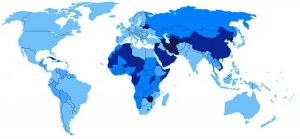IISS treffer rimelig godt i sin analyse:
Russia’s Strategic Plans Failing in Balkans, IISS Says
Russia has been making a concerted bid to create four neutral or pro-Russian states in the Western Balkans – but the results have been mixed, according to the London-based think tank, the International Institute for Strategic Studies, IISS.
Dismissing claims made in the UK and Western media that “war is brewing again” in the Balkans, the think tank says the bigger danger is concerted Russian penetration, aimed at creating a bloc of four neutral or friendly states in Serbia, Montenegro, Bosnia and Macedonia.
In pursuit of this goal, the IISS says, Moscow has set up a slew of pro-Russian media and other organisations in the region - 109 in Serbia alone and at least 30 in Macedonia - including media outlets and so-called “friendship” associations, as well as fomenting links with parties in Serbia, Macedonia’s former ruling VMRO DPMNE party and the opposition Democratic Front in Montenegro.
Russia’s “main tools of influence” in the Balkans, it adds, include “websites promoting Russia and glorifying Putin and Russian military prowess”, which echo the official line of RT and Sputnik and whose stories routinely “claim that the West and NATO are trembling before the might of Russia, that the EU is on the brink of collapse or that NATO or some other Western entity is behind an imminent Albanian military drive to start a new war and create a Greater Albania”.
However, IISS said Russia’s Balkan campaign had achieved only mixed results, starting with a major setback in Macedonia, where the Moscow-backed VMRO DPMNE party has been forced to cede power to the Social Democrats, and Montenegro’s accession to NATO, despite furious Kremlin opposition.
As a result of the latter, almost “the entire northern shore of the Mediterranean, from Gibraltar to the Syrian border, is now under NATO control, and the Russian navy will be unable to gain coveted access to Montenegrin port facilities,” IISS remarked.
Turning to other security dangers to the region, the IISS described Islamist radicalism as a real but “exaggerated” threat.
Some 780 people from the region went to Iraq and Syria between 2012 and the spring of 2016, it noted, including just over 300 from Kosovo and about 200 from Bosnia.
However, the IISS said frequent claims that Kosovo and Bosnia had exported more jihadists than any other European states were wrong, if the figures are calculated on a per-capita basis.
“A terrorism threat certainly does exist [in the Balkans] … but the problem is not as serious as it is in France, the UK or Belgium,” the IISS maintained.
The IISS also dismissed media claims that another war is likely to start in the region, noting: “Serbia and Croatia are not poised to start a new war.”
A bigger problem, it said, was the consistent erosion of democratic standards, the weakness of the free media, the susceptibility of justice systems to patronage and political influence and corruption.
“A new word has recently entered the lexicon for describing Western Balkan countries that are not true democracies but nevertheless are progressing towards EU accession – ‘stabilitocracies,’” it concluded.




